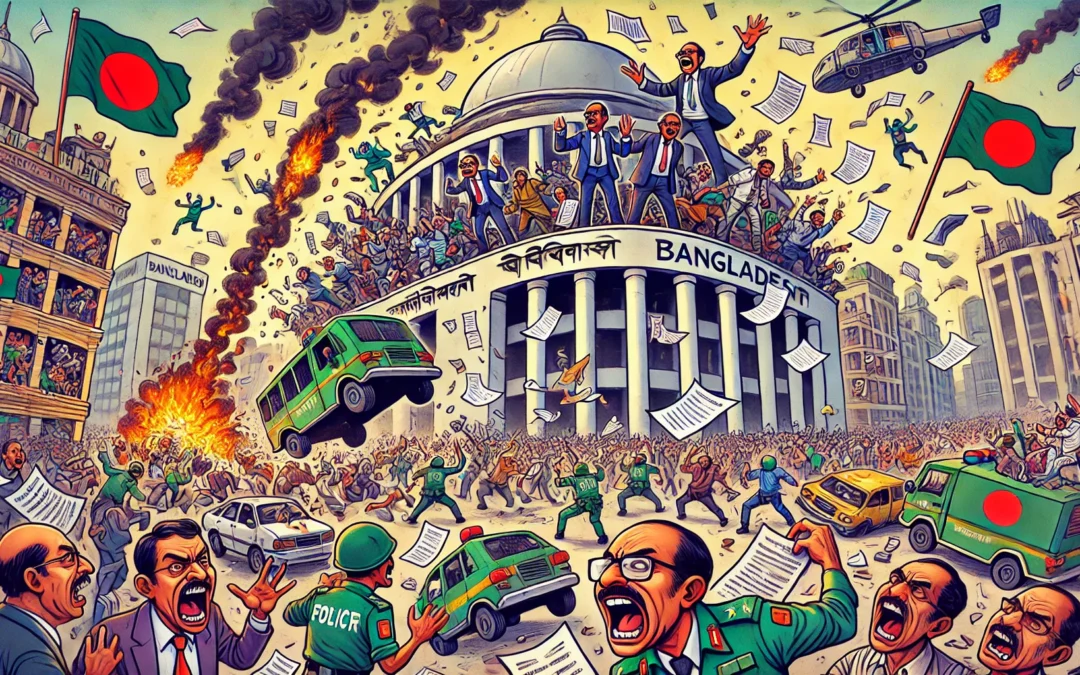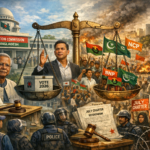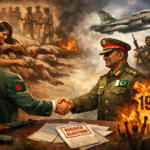1. Undermining the Sacrifice of 1971: The Myth of a “Second Republic
The Interim Government’s audacious claim of establishing a “Second Republic” is a direct insult to the millions who laid down their lives during the Liberation War of 1971. The so-called revolution’s leaders seem intent on erasing the historical achievements of Bangladesh’s independence and dishonouring the blood-soaked legacy of those who fought for freedom. This notion of a Second Republic undermines the legitimacy of the existing nation-state, one born out of immense struggle. It stands as an insult to the foundational values of sovereignty, independence, and democracy.
In pushing for this fraudulent republic, the Interim Government reveals itself as a vehicle of ideological colonization, a force trying to rewrite history in favour of its myopic, self-serving narratives. By attempting to render the 1971 war obsolete, they have alienated millions of Bangladeshis who see this as a betrayal of the nation’s founding principles.
2. Complete Anarchy and Lawlessness
If there is one hallmark of this Interim Government, it is their unparalleled ability to foster chaos. From rampant mob violence to institutional dysfunction, the country has descended into lawlessness under their reign. Civil institutions are paralyzed, the judiciary has lost its independence, and the law enforcement agencies have been co-opted into tools of oppression rather than justice. This anarchy is not accidental but an intentional strategy to perpetuate fear, silence dissent, and consolidate power.
Ordinary citizens have no faith in the rule of law, and corruption has spiralled out of control. Vigilantism and mob rule have replaced the justice system, further eroding public trust. The so-called revolution promised order and reform; instead, it delivered unbridled chaos.
3. Obliterating the Gains of Bangladesh Over the Last 54 Years
Over five decades, Bangladesh has achieved remarkable progress in multiple sectors, from economic growth and social development to strides in education, women’s empowerment, and technology. Yet, in the short span of its rule, the Interim Government has managed to unravel much of this progress. Fueled by policy mismanagement and international isolation, economic stagnation has reversed years of poverty alleviation and infrastructural development.
The social fabric, meticulously woven over decades, is now fraying under the weight of polarization and sectarianism encouraged by the government. Bangladesh, which had emerged as a model for developing nations, is now teetering on the edge of irrelevance, thanks to this interim regime’s regressive policies and visionless governance.
4. Tampering with the Constitution
The Interim Government has shown no hesitation in tampering with the constitution—a document born out of the struggles of 1971 and the aspirations of an independent people. These unconstitutional amendments are not reforms but blatant power grabs designed to legitimize their authoritarian rule.
In doing so, they are destabilizing the country’s legal foundation and threatening the fragile balance of democratic governance. Their attempts to institutionalize changes that serve their agenda betray their contempt for constitutional sanctity and the people’s will. These reckless actions create a legal and political vacuum that risks plunging the nation into prolonged instability.
5. Betraying Their Own Charter
Ironically, the Interim Government’s actions contradict the charter they laid out. What was once billed as a temporary arrangement to bring stability and reform has become a power-hungry, directionless regime. They have disregarded every principle of transparency, accountability, and impartiality, revealing themselves as hypocrites whose only goal is the consolidation of power.
This betrayal underscores the Interim Government’s leadership’s lack of vision and sincerity. Their charter has become a farce, a hollow document that no longer holds any value, even to themselves.
6. Removing the Portrait of Bangladesh’s Founder
Perhaps the most symbolic and sinister move of this government has been the removal of the portrait of Sheikh Mujibur Rahman, the Father of the Nation, from the Presidential Palace. This is more than just an act of historical revisionism—it is an outright declaration of their intent to erase Bangladesh’s identity and heritage. By undermining the legacy of Bangabandhu, they are erasing the soul of the nation, replacing it with their distorted vision.
This move has outraged citizens across the country and the diaspora, further isolating the government from the people. It is a disgraceful attempt to delegitimize the very foundation upon which modern Bangladesh stands.
7. Dodging the Forthcoming Election
True to its authoritarian tendencies, the Interim Government is employing every tactic to avoid the upcoming elections. From manipulating the electoral process to suppressing opposition voices, its aim is clear: to cling to power at all costs. Its fear of a democratic mandate is telling, as it reflects its awareness of its unpopularity and the illegitimacy of its rule.
By undermining free and fair elections, they are pushing the country further away from democratic norms and risking international condemnation. Their actions reveal a desperate regime willing to sacrifice the nation’s democratic future for their survival.
8. Suspicious Closeness to Pakistan
The Interim Government’s alarming cosiness with Pakistan is a betrayal of Bangladesh’s hard-won sovereignty. Fifty-four years after independence, this government’s overtures to a country whose forces inflicted untold atrocities on the people of Bangladesh are deeply disturbing. Their proximity to Pakistan raises serious questions about their intentions and allegiances.
This relationship is not just a slap in the face of the nation’s history—it is a threat to its independence. The government’s actions suggest a willingness to compromise Bangladesh’s sovereignty in exchange for regional alliances that serve its agenda.
9. Mob Culture in the Name of Revolution
The Interim Government’s reliance on mob culture is a dangerous precedent that threatens the very fabric of the nation. Their use of mob violence to silence dissent and enforce their rule reveals their inability to govern through legitimate means. They are fostering a culture of fear, instability, and lawlessness by perpetuating mob rule.
This mob mentality is eroding social cohesion and pitting communities against each other. Far from being a tool of revolution, it is a weapon of destruction that is tearing the country apart.
10. Appointment of Unqualified Advisors
Appointing unqualified and inexperienced advisors to the Interim Government is a testament to its incompetence. These individuals lack the expertise, experience, and vision required to run a public office, let alone guide a nation through a period of turmoil. This nepotism and cronyism have resulted in disastrous policies and decision-making, further exacerbating the country’s crises.
Instead of relying on capable professionals, the government has surrounded itself with sycophants and opportunists, ensuring their failures will only multiply.
11. Is It All Going to Fall Flat?
In a word, yes. The Interim Government’s foundation is built on lies, incompetence, and betrayal. Their agenda is unsustainable, their support base is dwindling, and their policies are leading the country toward collapse. The people of Bangladesh, with their resilience and love for democracy, will not tolerate this regime for long.
History has shown that regimes built on deceit and oppression eventually crumble under the weight of their contradictions. The Interim Government is no exception. Their inability to deliver on their promises, combined with their destructive policies, ensures that their fall is inevitable. The only question is how much damage they will inflict before they are consigned to the dustbin of history.
Conclusion
The Interim Government, born from a so-called radical revolution, has proven to be an unmitigated disaster. From undermining the sacrifices of 1971 to fostering lawlessness, tampering with the Constitution, and aligning with historical enemies, it has betrayed the nation at every turn. It’s visionless governance and authoritarian tactics are pushing Bangladesh toward the brink. It is not a matter of if but when this house of cards will collapse, leaving the nation to pick up the pieces again.






